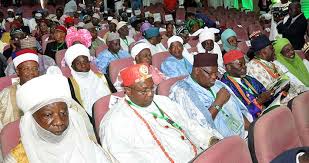Environment Committee recommends 2% increase in Ecological Fund to States
A two-percent increase in Ecological Fund allocation to states of the federation has been recommended by the Committee on Environment at the on-going National conference in Abuja. The committee said on Wednesday that the increase became necessary in view of the expanding cost of battling ecological issues in several states partially brought about by global climatic changes. The committee on Environment is headed by Senator Florence Ita-Giwa from Cross River State, and the 24 year old Yadoma Bukar Mandara from Borno State, the youngest delegate, who serves as Vice Chairman. Ita-Giwatold journalists that the two per cent increase which would bring the total ecological Fund allocation to five percent would still be like a drop in the ocean of needs. Alsoon Wednesday, the Committee, in its final report, suggested the establishment of an environmental court nationwide specifically tasked with the trial of individuals, groups and organizations responsible for environmental pollution. The chairman said such a court would be opened to hear cases involving gas flaring,desertification, erosion and oil spillage that have completely damaged the environment across the country. Another recommendation by the Committee was the call for compensation to be paid to the displaced Bakassi people over loss of oil funds and aquatic wealth. The chairman of the National Salaries Income and Wages Commission, Dr. Richard Egbuna, who appeared before the Committee on Public Finance and Economy also on Wednesday said that the Revenue Mobilization and Fiscal Allocation Commission was encroaching on their constitutional duties. He told the committee that the commission has harmonized the salaries of the military, paramilitary, the police, the academia and the civil service. But he said due to constant agitations by medical doctors, their salary has not been stable. On the lingering strike by Polytechnic lecturers, he said that the strike was not about salaries. According to him, a government panel set up in 2002 agreed that polytechnics should cross the bar of level 14. But during implementation staff were promoted one level ahead of their levels which left unpaid arrears of over N40 billion. He pointed out that names of staff of Staff schools and Guest Houses run by polytechnics and other institutions which are basically private ventures, are routinely smuggled into the institutions’ staff list and payrolls, a development which has left the government with a bill of about N4 billion. He said the commission also discovered that the chief executives of these institutions increased their salaries at will. On call duty allowance for doctors, the chairman said that a unit of call duty was eight hours and the maximum unit payable is 40 units in one month; but he said doctors resist being put on roster to determine when they are on call duty, and that leads to every doctor getting 40 units a month whether they are on call ornot. On minimum wage, he said that the Commission was created when the minimum wage was N250.00 (two hundred and fifty naira) until the year 2000 when it was moved toN5, 500.00 but pointed out that job evaluation which was last carried out 42 years ago has been brought into the purview of National Salaries and Wages Commission. The Commission was in the process of carrying out another job evaluation, he added. He said that the commission was also carrying out a regional pair survey and has three full time commissioners and four part time members. The committee on Citizen and Immigration on Wednesday agreed that section 29. 4(b)of the constitution which deals with the right of the Nigerian woman to renounce her citizen should be amended to 18 years. The committee also agreed that the phrase or clause that states that the president should appoint an indigenes of a state as minister should be repealed and that the president could appoint anybody who is resident in a state as the nominee of that state. The committee also recommended for the creation of a special unit within the Nigeria Immigration Service devoted to checking the influx of illegal immigrants.


